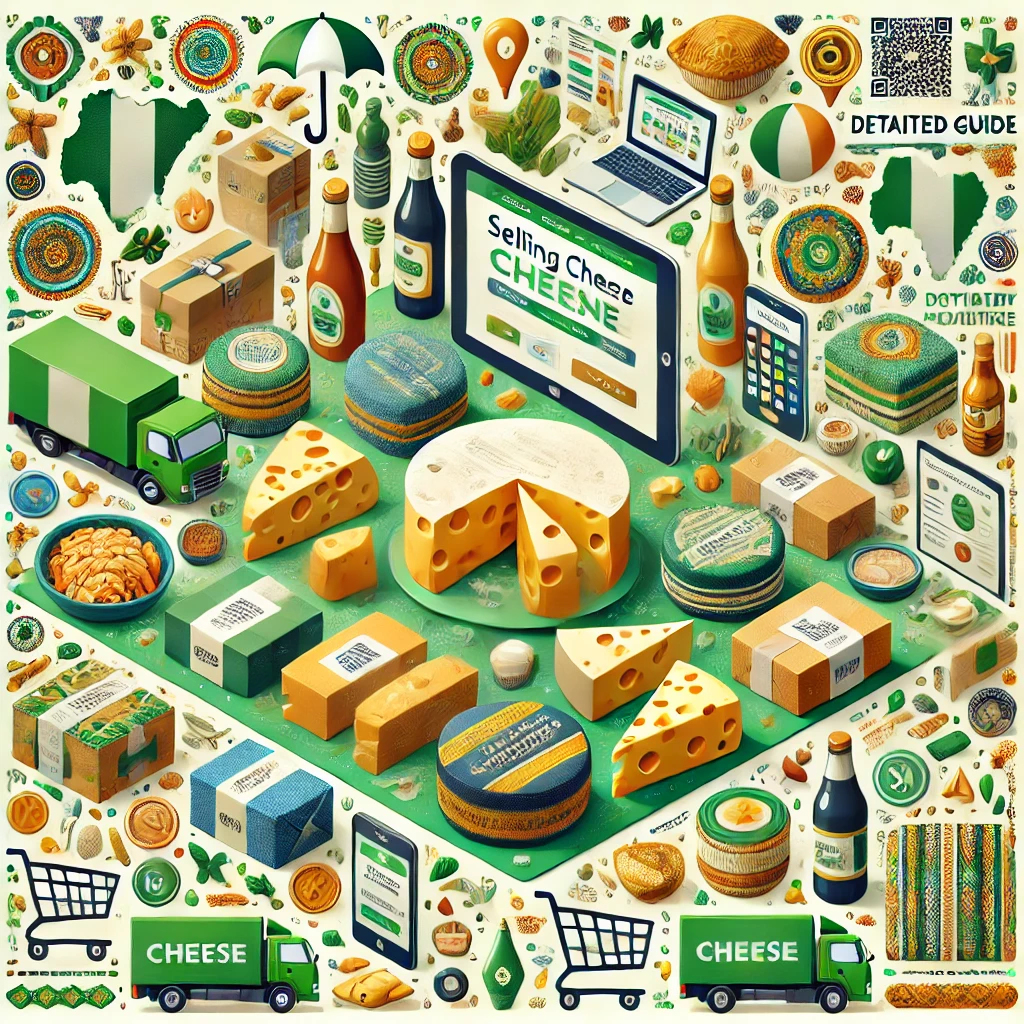Nigeria’s food market continues to evolve, and dairy is one of its fastest-growing digital sectors. With urban demand for cheese rising in Lagos, Abuja, Port Harcourt, Ibadan, Kano and Enugu, selling cheese online has become a profitable micro-business opportunity—especially for home cheesemakers, dairy farms, and specialty markets.
From mozzarella for pizzerias to soft unripened Nigerian cheese like wara and nono-based curd, online dairy retail is expanding thanks to Nigeria’s booming e-commerce environment, flexible logistics, and youth-driven digital marketplace.
This guide explains everything you need—from packaging and storage to pricing, safety regulations, delivery logistics, and customer targeting—to successfully sell cheese online in Nigeria.
🧀 Understanding the Nigerian Cheese Market
Cheese remains a niche but rapidly expanding product in Nigeria. Urbanization, restaurant expansion, health-centric diets, and café culture are key drivers.
Popular Cheese Types Sold Online in Nigeria
| Cheese Type | Demand Level | Buyers |
|---|---|---|
| Mozzarella | very high | pizzerias, restaurants |
| Cheddar | high | bakeries, sandwich stores |
| Gouda & Edam | moderate | expat communities, gourmet stores |
| Soft Wara | high | home cooks, street vendors |
| Feta-style brined cheese | growing | salad & pasta customers |
| Spreadable cream cheese | high | pastry shops |
| Ricotta & paneer | moderate | Indian & Middle Eastern kitchens |
Nigerians are shifting from powdered dairy products toward fresh and semi-processed cheese, especially in hospitality and bakery sectors.
📌 Where to Sell Cheese Online
Primary Online Platforms
| Platform | Benefit |
|---|---|
| Instagram Shop | fastest conversion + visuals |
| WhatsApp Business | direct negotiation + recurring orders |
| Facebook Marketplace | high visibility + groups |
| Jumia Food / Specialized Food Apps | premium reach |
| TikTok Live Sales | trending dairy promotion |
| Website store (Shopify, Flutterwave store) | brand credibility |
Additional Food-Focused Spaces
-
Jiji.ng
-
Local gourmet collectives
-
Google Business Profile for map search
🧱 Legal & Safety Considerations
Cheese is a temperature-sensitive, perishable dairy, meaning compliance matters.
Required Steps
| Requirement | Purpose |
|---|---|
| NAFDAC listing/registration | safety & consumer trust |
| Hygienic production space | avoids contamination |
| Proper labelling | expiry, ingredients, milk type |
| Dairy handling certification (optional) | brand credibility |
Even for home-scale cheesemakers, NAFDAC “Small-Scale Food Vendor” recognition boosts trust.
🥶 Packaging & Preservation
Because Nigeria’s climate is hot and humid, cheese packaging and cold logistics are essential.
Packaging Methods
| Cheese Type | Packaging |
|—|—|—|
| Mozzarella | vacuum pack + ice gel |
| Cheddar & Gouda | vacuum + wax optional |
| Soft wara | brine container + sealed lid |
| Cream cheese | food-grade tubs |
| Ricotta/paneer | airtight box + absorbent mat |
Cold Chain Tools
-
ice packs / cold gel packs
-
thermal insulated cooler bags
-
refrigerated bike boxes
-
styrofoam cold boxes for interstate
Delivery must occur within 1–8 hours depending on distance to retain freshness.
📦 Delivery & Logistics Strategy
Best Delivery Methods
| Option | Ideal For |
|---|---|
| Motorcycle courier | Lagos inner-city fast drops |
| GIG Logistics cold delivery | longer routes |
| Dispatch bikes with cooler boxes | local cafés, restaurants |
| Personal drop-off | subscription clients |
Delivery Timing Window
-
early morning (6am–10am)
-
evening cool hours (6pm–9pm)
This avoids midday spoilage or bacteria acceleration.
💸 Pricing Strategy
Price cheese competitively while emphasizing freshness and hygiene.
Pricing Models
| Method | Best For |
|---|---|
| Per kg/per 500g | restaurants & bakeries |
| Subscription weekly box | households |
| Wholesale to pizzerias | consistent cash flow |
| Party/event platter pricing | festive seasons |
A subscription dairy box (milk + cheese + yogurt) has high retention value.
🎯 Customer Target Groups
High-Value Buyer Segments
| Group | Why Important |
|---|---|
| Restaurants & Pizzerias | bulk orders, weekly need |
| Hotels & cafés | premium cheese menus |
| Bakeries & pastry shops | spreads & fillings |
| Expat & diplomatic communities | consistent cheese consumption |
| Fitness & keto consumers | high-protein demand |
| Party/event caterers | cheese platters, dips, pastries |
📣 Marketing & Branding
Strong Brand Essentials
-
clear cheese type labelling
-
ingredient & expiry transparency
-
halal certification if applicable
-
photos showing freshness
Best Marketing Tactics
| Tactic | Effect |
|---|---|
| Instagram reels showing stretch mozzarella | fastest conversion |
| WhatsApp status daily menu | direct response |
| TikTok cheese slicing ASMR | high virality |
| Food bloggers influencer collabs | trust + reach |
| Packaging with logo stickers | repeat recognition |
⭐ Sales Boosting Ideas
-
Cheese tasting mini boxes for new buyers
-
Bundle offers (pizza mozzarella + cheese dip + olives)
-
Free delivery threshold (orders above ₦15,000)
-
Holiday platters (Easter, Christmas, Eid, weddings)
Cheese training workshops can also position you as expert, not just seller.
🧾 Common Mistakes to Avoid
| Mistake | Consequence |
|---|---|
| non-refrigerated delivery | cheese spoilage |
| unclear labelling | mistrust & safety issues |
| ignoring hygiene certification | limits market expansion |
| selling only via DMs | loss of credibility |
| overstocking in hot months | waste & bacteria risk |
⭐ Conclusion
Selling cheese online in Nigeria is not only viable—it is rapidly profitable for dairy makers who prioritize:
-
cold storage integrity
-
clean packaging
-
transparent labelling
-
fast logistics
-
smart digital marketing
With growing urban cheese demand, better courier systems, and booming online shopping habits, Nigerian dairy entrepreneurs can confidently scale cheese commerce from home kitchens to premium delis and national supermarkets.
FAQs – Selling Cheese Online in Nigeria
1. Do I need NAFDAC approval to sell cheese?
For scaling and formal retail, yes. Small-scale home start can begin but approval boosts trust.
2. What packaging works best in Nigerian heat?
Vacuum sealing with insulated coolers and ice packs.
3. Can cheese be delivered nationwide?
Yes, with cold-chain logistics. Some soft cheeses need same-day drops.
4. What cheese sells fastest in Nigeria?
Mozzarella, cheddar, cream cheese, and wara.
5. How do I attract customers online?
Instagram reels, WhatsApp menus, food bloggers, and holiday cheese bundles.






